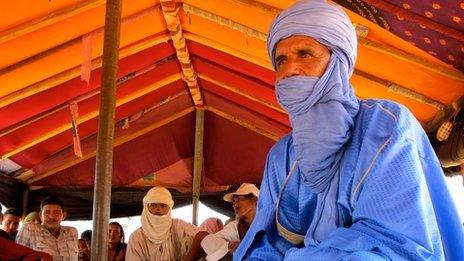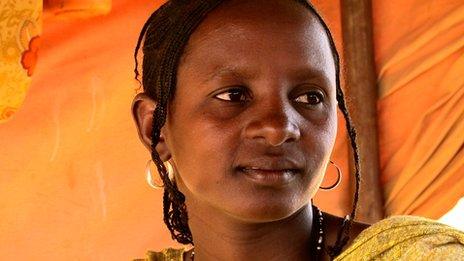Mali refugees seek exit from Mauritania camp life
- Published
The BBC's West Africa correspondent, Thomas Fessy, inside the refugee camp of Mberra
Tens of thousands of Malians, mainly ethnic Tuaregs, fled into Mauritania last year after a mixture of separatists and jihadi groups seized control of their home towns. The militants have since been ousted by a French-led campaign and the refugees are starting to plan their return home, as the BBC's Thomas Fessy reports from Mberra camp.
Mohammad Ag Mohammed Hamma is growing impatient. His face almost entirely covered by a washed blue turban, the village chief of Tin-Telout, on the outskirts of Timbuktu, cannot bear this "undignified life" any more.
"Living here has been humiliating," he complains. "The food rations they give us aren't enough and we feel like beggars asking for more all the time."
He has been back to his village three times since he fled last year, and he is planning on crossing the border again by the end of this week, this time for good.
Only about 500 refugees have decided to leave the camp so far. Aid agencies believe that if northern Mali shows signs of stability in the months to come, the first real waves of returns could start to be seen some time in 2014.
For now, for all the desire to return, instability remains. A peace deal is one thing, but a lasting agreement is another.
On Saturday, two suspected Islamist militants drove a car-bomb into the Malian army camp in Timbuktu and blew themselves up, while on Sunday Tuareg rebels exchanged fire with government troops in the remote town of Kidal.

Village chief Mohammad Ag Mohammed Hamma finds camp life 'humiliating'
Painting a piece of leather made out of a goat skin that she will sell at the market, Zouda Walett Infa says she does not intend to go back home until she can be certain that peace has been achieved.
The 25-year-old mother of three only arrived seven months ago and fears potential inter-communal attacks.
Too late
In the meantime, other tensions are palpable inside Mberra camp.
At the main health centre, two-year-old Mohammed requires full attention. He has got cerebral malaria, which can kill fast.
His eyes are glazed and he is clearly struggling to breathe as his mother watches over him.
Doctors say he needs an urgent blood transfusion, and order his evacuation to the nearby town of Bassikounou, where international organisations have set up their bases.
The little boy is hurried into an ambulance, unresponsive. His mother and family members cram into the back of the car.
But despite the doctors' best efforts, the transfusion and treatment come too late.
Children always suffer the most in refugee camps and Mberra is no exception. Malaria and malnutrition are preying on the young and vulnerable.
Dr Fabien Kabongo from Medecins Sans Frontieres (MSF, Doctors Without Borders) - which warned of "appalling" conditions in the camp earlier this year - says that a lot more needs to be done to improve standards here.
"Shelters have been seriously damaged by the rains and with the upcoming colder season, we will see many lung infections if they are not replaced," he says.
"And too many refugees still have no shelter at all."
There are also issues with registering for food handouts. Some of the refugees who were given food on arrival claim that they have now been taken off the distribution lists.

Zouda Walett Infa says she is no longer getting UN food handouts
"On my fourth distribution, I queued up but I was sent away with nothing," Ms Infa says.
She hands me her registration documents that are no longer accepted by the UN refugee agency.
"The same thing happened during the distributions that followed each month."
Countering criticism of their management of Mberra camp, the UN refugee agency, UNHCR, says it is introducing a new biometric registration process.
"Refugees have been informed," Hovig Etyemezian, who runs the agency's operations here, explains.
"Most of them have come for the new enrolment where they were given a new document,"
"It's blue and that's the one they must use for the distributions."
"Those who have missed the enrolment can come to our litigation centre."
Refugee leaders claim that up to 6,000 are in the same situation as Ms Infa. Mr Etyemezian rejects such a figure.
UN sources say that the refugee agency is under pressure from donor countries to fund smaller scale operations at Mberra camp.
Yet, angry refugees trashed a registration centre at the camp in early September, prompting the UNHCR to suspend its activities for two weeks. It has only just resumed.
Signs of hope
Inside the camp, some are busy filling jerry cans of water while others play an improvised board game on the sand with pieces of wood.
These refugees came here because they did not trust either the rebels or the government army in Mali.
They are now willing to believe that the newly-elected president does want to create a safe environment for their return home.
But they will need guarantees that all Malians will be able to live as a united people - one reason why so many ethnic Tuaregs fled is that after the separatists took up arms, there were reports of attacks on Tuareg civilians by members of other communities.
"Personally, I am confident I can go back because I know my neighbours," says Mr Hamma.
"We're no stranger to one another, we all know what's happened."
"I am sure the governor, the army zone commander and the police chief of where I am from can be trusted when they say that we will live together."